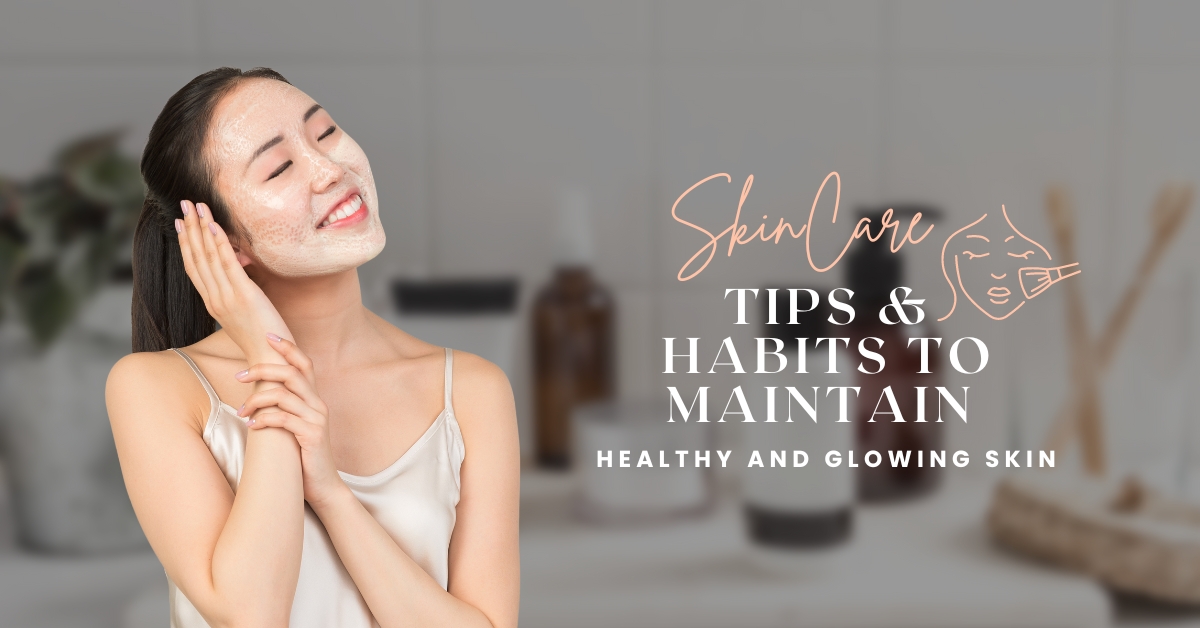Skincare Tips & Habits to Maintain Healthy and Glowing Skin
Maintaining healthy and glowing skin is not just about looking good; it’s about feeling good and ensuring that your skin, the body’s largest organ, is functioning optimally. The skin acts as a barrier against environmental aggressors, helps regulate body temperature, and plays a role in immune defense. A consistent skincare routine, along with a healthy lifestyle, can improve your skin’s appearance and health. Here’s a comprehensive guide with top ten tips to help you maintain healthy and radiant skin.
What Are Some Effective Skincare Tips and Habits to Maintain Healthy and Glowing Skin?
1. Stay Hydrated
Hydration is key to maintaining healthy skin. Water helps in maintaining skin elasticity, preventing dryness, and flushing out toxins from your body. Drinking at least 8 glasses of water daily ensures that your skin remains hydrated from the inside. Additionally, incorporating water-rich foods like cucumbers, watermelon, and oranges into your diet can also boost your hydration levels. Proper hydration helps maintain a clear, glowing complexion and reduces the likelihood of developing wrinkles and fine lines.
2. Follow a Consistent Skincare Routine
Establishing and adhering to a consistent skincare routine tailored to your skin type is crucial. Start with cleansing your face twice daily to remove dirt, oil, and impurities. Follow this with a toner to balance your skin’s pH levels, and then apply a moisturizer to keep your skin hydrated. Exfoliate your skin 1-2 times a week to remove dead skin cells, but avoid over-exfoliating as it can strip your skin of its natural oils.
3. Protect Your Skin from the Sun
Sun exposure is one of the leading causes of premature aging, dark spots, and an increased risk of skin cancer. It’s essential to apply a broad-spectrum sunscreen with at least SPF 30 every day, irrespective of the weather conditions. Reapply sunscreen every two hours when you are outdoors for extended periods. Additionally, wearing protective clothing, hats, and sunglasses can provide extra protection against harmful UV rays. Sunscreen not only protects against sunburn but also helps in preventing long-term sun damage.
4. Eat a Balanced Diet
Your diet plays a significant role in the health of your skin. Consuming a balanced diet rich in fruits, vegetables, lean proteins, and whole grains provides essential nutrients that promote healthy skin. Foods high in antioxidants, such as berries, nuts, and leafy greens, combat free radicals that cause skin aging. Omega-3 fatty acids found in fish and flaxseeds help keep your skin hydrated and reduce inflammation.
5. Get Enough Sleep
Sleep is vital for skin repair and regeneration. During sleep, your skin undergoes a restorative process, producing new collagen that prevents sagging and aging. Aim for 7-9 hours of quality sleep each night to maintain youthful skin. Establish a relaxing bedtime routine, avoid electronic devices before sleep, and ensure your sleeping environment is comfortable. Using a silk pillowcase can reduce friction against your skin, preventing wrinkles and maintaining skin hydration.
6. Avoid Smoking and Limit Alcohol Consumption
Smoking and excessive alcohol consumption can take a toll on your skin. Smoking narrows blood vessels in the outermost layers of the skin, reducing blood flow and depriving the skin of oxygen and essential nutrients. This leads to a dull complexion and premature aging. Alcohol dehydrates the skin and dilates blood vessels, causing redness and irritation.
7. Exercise Regularly
Regular physical activity boosts circulation, promoting the delivery of oxygen and nutrients to your skin, aiding in skin repair and renewal. Sweating during exercise helps detoxify your skin by expelling toxins and unclogging pores. Aim for at least 30 minutes of moderate exercise most days of the week. Always cleanse your face after exercising to remove sweat and impurities, which can cause breakouts if left on the skin.
8. Manage Stress
Chronic stress can negatively impact your skin, leading to issues such as acne, eczema, and psoriasis. Stress triggers the release of cortisol, a hormone that can increase oil production and lead to breakouts. Practicing stress-reducing activities like yoga, meditation, or deep-breathing exercises can help manage stress levels. Engaging in hobbies and activities you enjoy, spending time with loved ones, and ensuring you have time to relax can all contribute to better skin health.
9. Avoid Harsh Chemicals
Be mindful of the products you apply to your skin. Many commercial skincare products contain harsh chemicals, artificial fragrances, and alcohol, which can irritate the skin. Opt for products with natural ingredients and those specifically formulated for your skin type. Always do a patch test when trying new products to ensure they do not cause adverse reactions. Choosing gentle, non-comedogenic products helps maintain the skin’s natural barrier and prevents irritation.
10. Keep Your Environment Clean
Your environment has a significant impact on your skin. Change your pillowcases regularly to avoid the accumulation of dirt and oils that can transfer to your skin and cause breakouts. Avoid touching your face frequently to reduce the risk of spreading bacteria and dirt. If you live in a dry climate, using a humidifier can help maintain your skin’s moisture levels, preventing dryness and irritation.
In Conclusion
Achieving and maintaining healthy, glowing skin is an art that requires a holistic approach, blending a balanced lifestyle, a consistent skincare routine, and mindful habits. By weaving these ten tips into the fabric of your daily life, you can shield your skin from harm, keep it deeply nourished, and ensure it stays radiant and youthful. For those seeking an extra touch of professional care, consider visiting the best facial services in Sahakar Nagar, Bangalore. Investing time in your skin will pay off in the long run, giving you a stunning, healthy glow that boosts your confidence and leaves you feeling fabulous.




